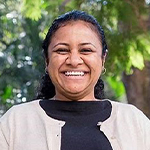The Legal Pluralism Program

About the Legal Pluralism Program
The Legal Pluralism Program includes the following projects that comprise a plan of collaborative work in the fields of comparative law and legal pluralism:
Aspects of Legal Pluralism in the South Pacific
This project involves research on aspects of legal pluralism in the South Pacific, building on the existing published work of the participants in this field. Research includes work on legal issues surrounding Pacific legal systems and constitutional questions, particularly those involving human rights.
We contribute to UQ’s work as Engagement, Research and Training Delivery Partner within Australia Solomon Islands Partnership for Justice (ASIPJ), the third program of Australian support to the Solomon Islands Government (SIG) justice sector. The goal of ASIPJ is to work closely with SIG to enable justice agencies to maintain delivery of their existing, core activities while clearly identifying and engaging with fundamental problems and critical issues affecting their ability to contribute to stability and offer access to justice for citizens.
Other research within this project includes Professor Forrest’s work, in partnership with UNESCO, focusing on the protection of underwater cultural heritage in Micronesia and Solomon Islands.
In February 2024, Professor Emerita and CPICL Fellow, Jennifer Corrin, addressed the International Family Law Association with a presentation on Family Law and the South Pacific: Pluralism and Mixed Family Law Systems.
Ms Unaisi Narawa-Daurewa’s work examines Indigenous identity, with particular reference to the iTaukei and Melanesian Peoples in Fiji. It includes research on definitions of Indigenous peoples under international law and in other comparable jurisdictions, such as Solomon Islands and Australia. It seeks to identify the problems arising from existing definitions and to explore avenues for resolving them.
Past research and publications within this part of the Program includes investigation into the plural regimes of family law in force in the South Pacific. This has included research on customary law and introduced law in the context of marriage, divorce and ancillary matters in a number of Pacific Island countries.
Participants: Professor Emerita Jennifer Corrin, Professor Craig Forrest, Ms Unaisi Narawa-Daurewa
Women and Law in Plural Regimes
This project explores the law and legal issues relating to women under plural regimes in Asia and the Pacific. Current research, funded by the United Kingdom Arts and Humanities Research Council and the Global Challenges Research Fund, focuses on the experiences of Pacific women in accessing and using marine resources in order to bring to light the relevance of their narratives in shaping policy and regulatory frameworks. This research, conducted by Professor Emerita Jennifer Corrin in collaboration with Dr Susan Farran and a number of Pacific Island researchers, focuses on Sustainable Development Goals, but is situated within the more general theme of the global challenge of gender equity and inclusion in building local resilience to threats to marine resource food security.
Another part of this project involves an examination of the inter-relationship of women, religion and law and the theoretical and practical implications of legal pluralism. This includes an analysis of the comparative advantages and disadvantages of the disparate regimes of law in force and the extent to which they are accessible to women. Professor Black conducts research on women in Brunei with the most recent article on Brunei’s ‘gender paradox’ published in a special edition on Women and Legal Change in Asia, for the Australian Journal of Asian Law. A second strand of research examines patriarchy in the courts. Professor Black, in an upcoming book chapter, 'The Syariah Factor: One of the Many Challenges for Foreign Judges in the Courts of Brunei Darussalam' in Anna Dziedzic & Simon Young (eds) Cambridge Handbook Foreign Judges on Domestic Courts (Cambridge University Press) examines patriarchy in both the common law and Syariah courts in Brunei.
Current publications include two chapters on de facto relationships in Solomon Islands and Vanuatu to be published in an edited collection by Cambridge University academics. Previous publications within this program include two chapters published in 'Mixed Blessings: Law, Religion and Women's Rights in the Asia-Pacific Region' edited by Amanda Whiting & Carolyn Evans for Brill/ Martinus Nijhoff, 2006: [Ann Black, ‘Islamisation, Modernity and Re-positioning of women in Brunei’, 211-239 & Jennifer Corrin 'Between a Rock and a Hard Place: Women, Religion and Law in Solomon Islands' 101-128 ]; Ann Black, ‘Adaptations of Islamic family law for the Australian Context’ for (2017) 30 Australian Family Law Journal, 159-179; Ann Black, ‘Monarchy in Brunei: Marching to the beat of a different drum’ (2020) 7 (2) Royal Studies Journal Special edition ‘Engendering, the Monarchy’: 94 - 116 and ‘The Sultanate of Brunei’s Gender Paradox’ (November 2022) 23 (2) Australian Journal of Asian Law: Women and Legal Change in Asia, Article 4:45 -61.
Brooke Thompson, 'The Accommodation of Islamic Inheritance Law in "Secular" India' in Bhuiyan and Black (eds), Freedom of Religion and Religious Diversity: State Accommodation of Religious Minorities; Brooke Thompson, ‘Do Islamic Succession Laws for Muslim Women Violate the Current Human Rights Framework? Developing an Ethical Working Model for Muslim Minority Nations’ (2016) 13 Muslim World Journal of Human Rights 45.
In addition, this research field of women and law in plural regimes has been of interest for LLB and LLM research projects supervised by CPICL Fellows. Their dissertations have considered aspects of law impacting women in Afghanistan, Pakistan, Sri Lanka, Bangladesh, South Korea, Malaysia and the South Pacific.
Participants: Professor Ann Black, Professor Emerita Jennifer Corrin, Dr Brooke Thompson
Legal pluralism in secular states
Although legal pluralism research is often centred on nations with formal pluralism (different streams of laws and courts based on religion or ethnicity) there is increasing interest today in secular multi-cultural countries like Australia where legal pluralism operates through the realm of the unofficial, non-state legal ordering. William Twining argued that a consequence of law’s complexity in the world today is dealing with ‘established, resurgent, developing, nascent and potential forms of legal ordering.’
This has led to research on ways by which secular legal systems can or should accommodate citizens who hold a religious or cultural imperatives laws other than those enacted by the state.
Much of the research has been on Islamic law in western nations. See:
Ann Black, ‘Cultural expertise in Australia: Colonial laws, customs, and emergent legal pluralism’ in Austin Sarat and Livia Holden (ed) Studies in Law, Politics, and Society, 2019 Emerald Publishing, 133-155; ‘Islamic Exceptionalism: Do the Religious and Legal Imperatives of Islam Necessitate Special Responses by Legal Regimes in Secular Nations’ in Erich Kolig & Malcolm Voyce (eds) Muslim Integration: Pluralism and Multiculturalism in New Zealand and Australia, Lexington Books, 2016, 229-250; ‘Adaptations of Islamic family law for the Australian Context’ for (2017) 30 Australian Family Law Journal, 159-179; ‘Can there be a compromise? Australia's state of confusion regarding Shari'a family law’ in Elisa Giunchi (ed) Muslim Family Law in the Western courts: experiences from Europe, Australia and North America, Routledge, 2013, 149-167; ‘In the Shadow of our Legal System: Shari’a in Australia’ in Rex Ahdar and Nicholas Aroney (eds) Shari’a in the West, Oxford University Press, 2010, 477 – 508; ‘Embracing Sharia-Compliant Products through Regulatory Amendment to Achieve Parity of Treatment’ 2012 (34) Sydney Law Review, 189 -211 (with Kerrie Sadiq); ‘Good and bad Sharia: Australia’s mixed response to Islamic law’ (2011) 17 (1) UNSW Law Journal, 383-412 (with Kerrie Sadiq); ‘Legal recognition of Sharia law: Is this the right direction for Australian family matters? (2010) 84 Family Matters, 64-69; ‘Accommodating Shariah law in Australia's legal system: can we? should we? (2008) 33 (4) Alternative Law Journal, 214-219.
Brooke Thompson, 'Islamic succession law in Australian courts - Re Estate of Ahmed Abou-Khalid' [March 2025] Retirement and Estate Planning Bulletin 34; 'Family Provision and Islamic Wills: Preserving the Testator's Wishes through Testamentary Arbitration?' (2023) 46(1) University of New South Wales Law Journal 205; 'Where there's a will, there's a way: Estate planning for Muslims in Australia' [June 2023] Retirement and Estate Planning Bulletin 56; 'Navigating Dual Legal Systems: Islamic Inheritance Law in Australia's Secular Legal Framework' (2022) 41(1) University of Queensland Law Journal 89; ‘Australia’s options for Sharia inheritance law: discussing India’s legally pluralistic inheritance law system as applicable to Muslims’ [2014] LAWASIA 79; Brooke Thompson, ‘Do Islamic Succession Laws for Muslim Women Violate the Current Human Rights Framework? Developing an Ethical Working Model for Muslim Minority Nations’ (2016) 13 Muslim World Journal of Human Rights 45.
Jahid Bhuiyan (with Darryn Jensen (eds.)), Law and Religion in the Liberal State 2020 Hart Publishers; and chapter 14: ‘Place of Shari’a in Australia’ at 233-251.
CPICL research on legal pluralism also considers secular nations in Asia including Singapore, India and Bangladesh. A new book, Religious Freedom in Secular States: A 21st Century Perspective, edited by CPICL scholars Jahid Bhuiyan and Ann Black (published by Brill 2022) explores the core values and tenets of secularism in international contexts.
Jahid Bhuiyan analyses legal pluralism in Bangladesh: ‘Contested Concept of Secularism in Bangladesh’(2022) American Journal of Comparative Law, https://doi.org/10.1093/ajcl/avab014; ‘Secularism in the Constitution of Bangladesh’ (2017) 49 (2) Journal of Legal Pluralism and Unofficial Law, 204; ‘Enforcement of Fatwas in Bangladesh and Violation of Constitutionally Guaranteed Fundamental Rights of Others: Compromising Between Rights (2017) 18 Asia- Pacific Journal on Human Rights and the Law, 155; ‘Law and Religion in Bangladesh’ (2017) 4 Brigham Young University Law Review at 101-130.
Ann Black compares the Singapore model with that of Australia: Replicating 'a model of mutual respect': Could Singapore's legal pluralism work in Australia?' (2012) 65 Journal of Legal Pluralism, 1-37;
Brooke Thompson has compared inheritance laws of India and Australia: Australia's options for Sharia inheritance law: discussing India's legally pluralistic inheritance law system as applicable to Muslims' [2014] LAWASIA 79
Participants: Professor Ann Black, Dr Brooke Thompson. Dr Jahid Bhuiyan.
Legal pluralism in Muslim nations
Asia is home to the world’s largest Muslim population, and is also one of the most multi-ethnic, multi-religious, multi-linguistic and multi-cultural regions in the world. How the legal systems in the Muslim-majority nations in the region respond to this inherent plurality is an important research area for CPICL scholars.
Ann Black, ‘Recalibrating the Scales of Criminal Justice in Brunei Darussalam: Religious Penal Clauses 1905-2018 in Li-ann Thio and Jaclyn Neo (eds) Religious Penal Clauses - Colonial Legacies and Contemporary Practice (Hart Publishing) 2021; ‘Brunei Darussalam: Whither Pluralism in the “Abode of Peace”? (2021) Religion & Global Society.https://blogs.lse.ac.uk/religionglobalsociety/2021/09/brunei.‘Casting the First Stone: the significance of Brunei Darussalam’s Syariah Penal Code Order for LGBTIQ Bruneians’ (2019) 20 The Australian Journal of Asian Law, 1; ‘Brunei Darussalam: Small by choice but great in the eyes of Allah’ in Tony Angelo & Jennifer Corrin, Small States: a Collection of Essays, 2019 CLJP, 81- 108;‘Colonial Legacies: family law in Singapore and Australia’, Nadirsyah Hosen (ed) Research Handbook on Islamic Law and Society, Edward Elgar, 2018, 16-47;‘Informed by Ideology: a Review of the Court Reforms in Brunei Darussalam’ in Andrew Harding & Pip Nicholson, New Courts in Asia, Routledge: Asian Law Series, 2009, 327-349; ‘Something amiss in the Sultanate of Brunei Darussalam: Reflections on diversity, inclusion, and the rule of law’ (2021) July Advancing Together, Special edition: Rule of Law in the Asia Pacific.
Jahid Bhuiyan, ‘Jizya and Religious Tolerance in Islam” (2017) 13: 1 Journal of International Law and Islamic Law, 19-29.
Participants: Professor Ann Black & Dr Jahid Bhuiyan

 Program manager
Program manager




